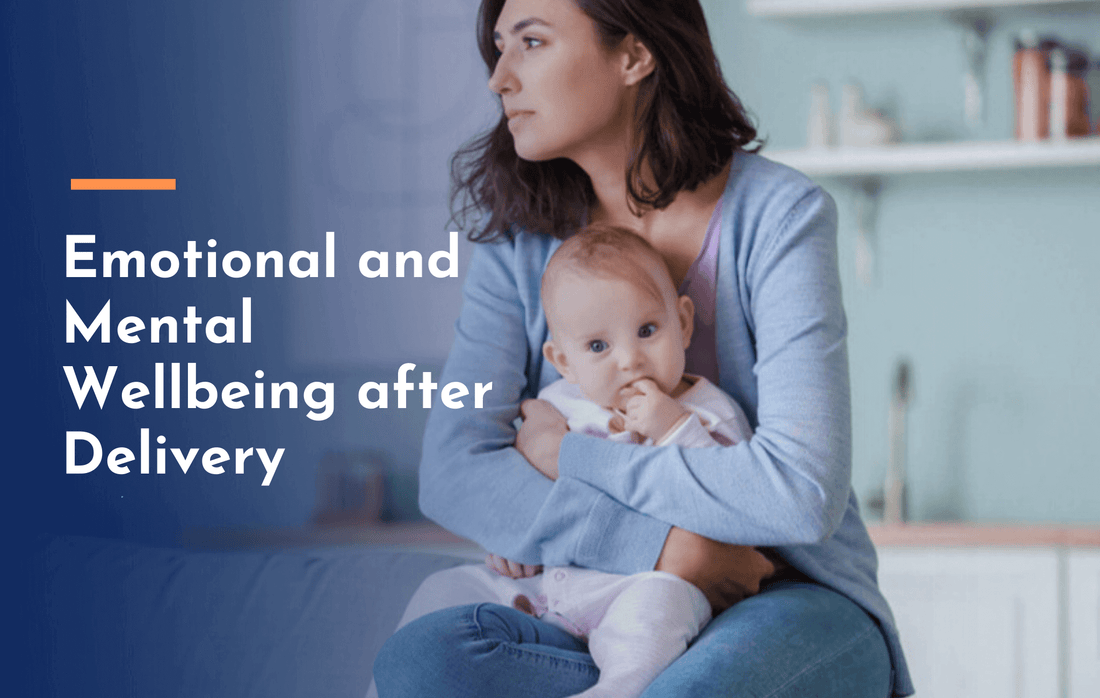The joy of welcoming a little one, and becoming a parent is both miraculous and challenging. So, have you ever wondered what happens in a woman’s body after childbirth? Immediately after giving birth, new mothers often step into a phase known as the postpartum or postnatal period. Think of it as the "after party" of childbirth a significant phase where a woman's body tries to return to its pre-pregnancy state. But it's not just about the body; it's a critical time for the mind too. Key points to remember:
- Postpartum Period: The phase right after childbirth.
- Motherhood Initiation: It’s more than just physical recovery; it’s about adapting to a new role.
Physical and Hormonal Changes After Delivery

Imagine your body as a factory. Before and during pregnancy, this factory is working and lively, tirelessly disturbing essential hormones like estrogen, progesterone, and the much-celebrated oxytocin. These hormones have been your faithful companions, ensuring the baby's growth and prepping your body for the delivery. They've been working in perfect harmony, like an orchestra playing a beautiful symphony.
But what happens after you welcome your little one into the world? The factory doesn’t just slow down; it almost seems to hang the “Closed for Maintenance” sign, leading to a precipitous drop in these vital hormones. And just as a sudden pause in our symphony can be annoying, this shift can turn your emotional world upside down.
Let's break down these hormonal changes after birth:
- Mood Shifts: It's like the weather in London; sunny one moment and rainy the next. You might be beaming with joy while holding your baby and the very next moment, you could be shedding tears for no apparent reason.
- Hormonal Imbalance: In this, you suppose yourself on a seesaw. Fun, right? But now imagine it's your emotions that are going up and down, making it less fun and more of a challenge. This emotional turbulence? It's the after effect of those hormonal changes.
Furthermore, besides these mood shifts, many women also experience physical symptoms like night sweats, hair loss, and even changes in breast size. The body is effectively resetting itself, similar to a computer rebooting after a massive software update.
It's essential to understand that these changes are normal. Yes, they can be overwhelming, but remember, every new mother is on this roller coaster ride. And while it's not always smooth sailing, knowing what's happening inside can make the journey a tad bit easier. So, when the hormonal waves hit, buckle up, ride them out, and always remember - this too shall pass. After all, isn't life's unpredictability what makes it so beautifully unique?
Also read: U-Shaped Maternity Pillow For Nursing Support.
Common Emotional Challenges Post-Delivery
Postpartum Depression (PPD)
Have you heard of the term "baby blues"? It's that short-lived feeling of sadness many women experience right after childbirth. But, here’s the twist what if those blues don't go away? This could be a sign of Postpartum Depression (PPD). Differences to note:
- Baby Blues: Temporary and usually fades within a few days or weeks.
- Postnatal Depression: Longer-lasting and may require professional intervention.
Anxiety and Postpartum OCD
Imagine you just bought a new car. At first, you're super protective, checking it obsessively. Now, amplify that feeling tenfold, and you might get close to the overwhelming worry some new moms feel. Postpartum OCD is like that repetitive behaviors and thoughts centered on the baby's well-being. Treatment Options:
- Professional Counseling: Speaking to therapists can provide coping strategies.
- Medication: Sometimes, prescribed meds can balance the emotional turbulence.
The Role of a Maternity Pillow in Addressing Emotional Challenges

Do you remember your favorite stuffed blanket from childhood? That comforting touch that soothed your worries away? In the vast world of motherhood, a maternity pillow plays a similar role, but with a bonus: it's designed especially for a postpartum body.
Imagine being enveloped in a cozy cocoon. That’s what a maternity pillow feels like. Specifically tailored for a mother's physique, it offers more than just physical support; it's like a comforting hug during those emotionally charged, sleep-deprived nights.
But let’s dig a little deeper. Why is this pillow becoming a must-have for new moms?
Physical Comfort
Trying to sleep on a bed of pebbles versus a cloud. A maternity pillow is that cloud. It adjusts around the woman's body, relieving pressure points and helping to find a comfortable sleeping position, especially after a C-section. Proper alignment means better sleep. And as we all know, sleep can be a rare luxury for a new mom.
Emotional Wellbeing
Ever noticed how everything feels a bit brighter after a good night’s rest? Sleep is like a magic potion for the brain. It restores, and refreshes. A maternity pillow, by ensuring physical comfort, indirectly promotes emotional well-being. When the body rests well, the mind follows suit.
Additionally, consider the bonding time with your baby. Breastfeeding or bottle-feeding can be a more relaxed experience with the right support. This maternity pillow ensures you don’t strain your back or neck, making those midnight feeding sessions a bit easier.
And there's something else too. The emotional rollercoaster of motherhood can sometimes feel isolating. While a maternity pillow isn’t a substitute for human connection, it provides a consistent, comforting presence. Think of it as your nighttime friend, always there, always supportive.
In a nutshell? Just as a trusty umbrella shields you during a sudden downpour, a maternity pillow can be that shield during the unpredictable showers of postpartum emotions. So, for all the new mothers out there, or if you're thinking of gifting a soon-to-be mom, why not consider this comforting companion? After all, in the journey of motherhood, every bit of comfort counts, right?
Seeking Support and Treatment

It’s okay to ask for directions when you're lost, right? Similarly, when navigating the maze of postpartum emotions, seeking guidance isn’t a sign of weakness. Recognize the signs, and don’t hesitate. Signs you might need professional help:
- Persistent sadness or overwhelming anxiety.
- Struggling to care for yourself or your baby.
Embracing the postpartum journey isn’t just about navigating the challenges but also about seeking support when needed. Just as you'd put on a jacket on a chilly day, tools like maternity pillows or counseling can provide warmth and comfort during this period.
Remember every phase has its ups and downs, and this too shall pass. And if things get tough? There's always help around the corner. After all, isn’t the journey of motherhood filled with learning, love, and sometimes a little bit of help? If you're experiencing challenges post-delivery, remember you're not alone. Consider investing in a maternity pillow for added comfort and always seek professional support if needed.
Also read: V shaped maternity pillow for breastfeeding.
FAQ’s
What is the postpartum period?
The postpartum or postnatal period refers to the phase immediately after childbirth. It's a significant time when a woman's body and mind adjust to life after pregnancy and encompasses both physical and emotional changes.
How do hormones change after delivery?
Post-delivery, there's a sharp decline in hormones like estrogen, progesterone, and oxytocin. This sudden dip can lead to mood shifts and hormonal imbalances, often likened to an emotional seesaw, affecting a new mother's overall well-being.
What's the difference between 'baby blues' and postpartum depression (PPD)?
'Baby blues' are short-lived feelings of sadness post-childbirth that usually fade within days or weeks. PPD, on the other hand, is more long-lasting, potentially severe, and may require professional intervention to address.
How can a maternity pillow help post-delivery?
A maternity pillow, designed for a mother's postpartum body, offers physical comfort by aligning the body for better sleep. This alignment not only promotes physical rest but indirectly supports emotional well-being by ensuring consistent, quality sleep.
When should I seek professional help post-delivery?
If you experience persistent sadness, or overwhelming anxiety, or find it challenging to care for yourself or your baby, it's essential to seek professional support. Early intervention can make a significant difference in postpartum recovery.


